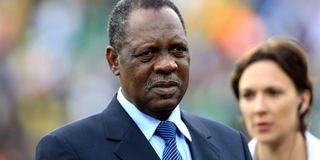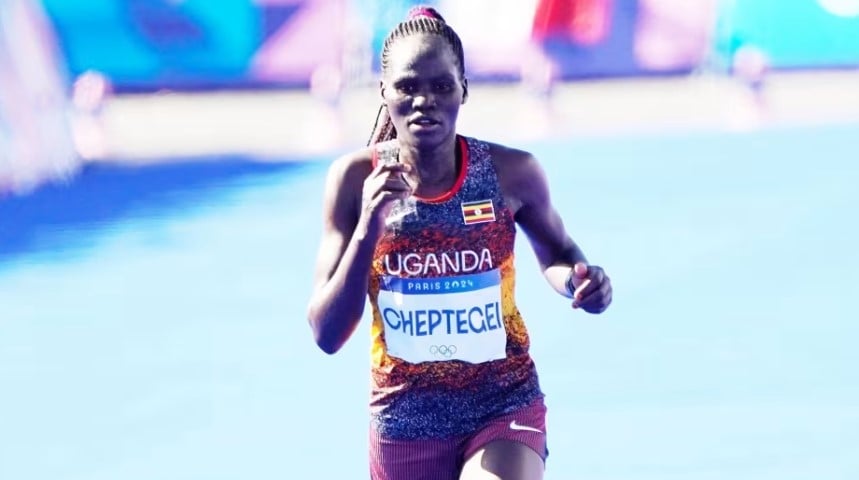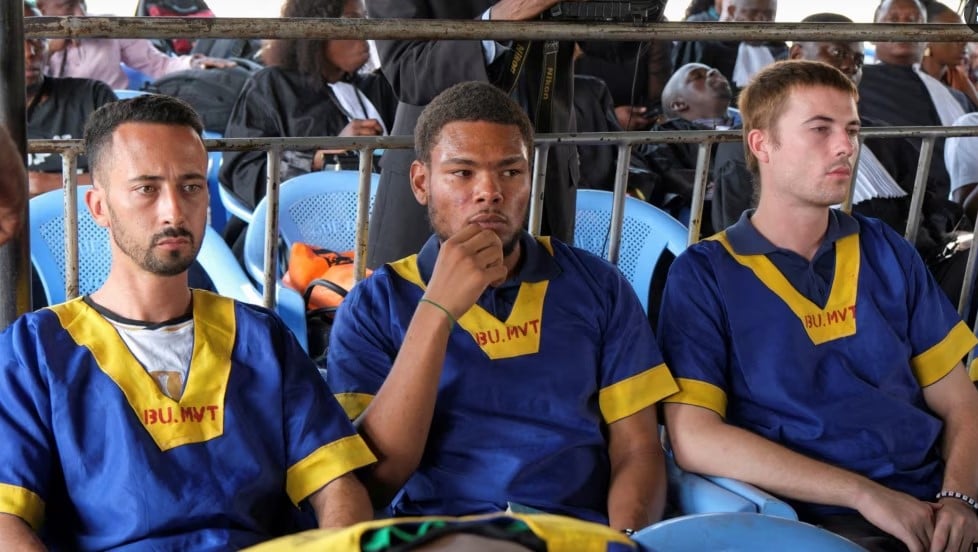Prime
Farewell to grandmaster: Hayatou rise, fall and a legacy to be remembered

Hayatou was a towering figure. PHOTOS/COURTESY
What you need to know:
With all said, Hayatou’s rule was a spotted one full of ups and downs. His first four years brought an aura of hope and optimism for African football in the build-up to the 1992 elections.
In the journals of African football, few figures loom as large as Issa Hayatou. The Cameroonian led the Confederation of African Football (Caf) from 1988 to 2017, an era which was marked by three decades of internal growth and global recognition for African football.
Hayatou passed away on Thursday, August 8, on the eve of his 78th birthday in Paris, France while following the Olympics in his death bed. He died due to a long kidney illness but left a storied legacy that will forever be remembered in Africa and beyond.
Hayatou held the record as the first African to lead the world football governing body after taking over from Sepp Blatter from October 2015 to February 2016. He died with a record of the longest-serving vice president of Fifa having been voted in December 1992 by Caf executive committee to replace the deceased General Mostafa. He left the position in 2017 after 25 years. He was conferred the Honorary President of Caf in 2021.
Caf president Patrice Motsepe celebrated his life by saying, “African Football will forever be grateful to President Hayatou for his enormous and far-reaching contributions, over many years to the development and growth of football in Africa.
Steady climb
Hayatou was born in August 1946 to a local ruler from a famous family in Garoua, the capital of the North region of present-day Cameroon. His brother Sadou Hayatou was the country’s prime minister for a year between April of 1991 and 1992 and was once touted to succeed Cameroon's president Paul Biya.
He started out as an athlete and is said to have broken several national records in the 400 and 800-metre races.
The astute politician-cum-administrator started as a teacher for physical education before rising to secretary general of Cameroonian football at just 28 years old. He rose to the presidency of Cameroon football in 1986, hitting two birds with the same stone as he was elected to sit on the executive body of Caf in the same year.
Settling in
As fate would have it, the Cameroonian ascended to the throne of Caf on March 10, 1988 in Casablanca, Morocco, the same city his nation was crowned African champions for the second time 17 days later after beating Nigeria 1-0 in the final.
Hayatou defeated Togolese opponent Godfried Ekoue in a tightly-contested poll winning by 22-18. He succeeded Sudanese administrator Abdel Halim, who had ruled for less than a year following the forceful retirement of Ethiopian Yidnekatchew Tessema due to illness.
Among Hayatou’s first major reforms at the African body was to increase the number of countries competing at the continent’s premier football competition, the African Cup of Nations.
Baby-boomer
At his arrival in 1988, the Afcon hosted only eight teams since 1965 but was increased to 12 for the 1992 edition. It started with three in 1957, four in 1962, six in 1963 to eight in 1965. He expanded it to 16 in 1996 and maintained it until his departure in 2017 when his successor Ahmad Ahmad added eight more teams.
Hayatou’s changes were cross-cutting. In 1991, the Cameroonian in his third term, introduced the U-20 Africa Cup of Nations which was called the African Youth Championship and then the U-17 and U-23 Africa Cup of Nations in 1995 and 2011. Uganda Hippos reached the final in 2021.
Caf also introduced the African Nations Championship (Chan), a tournament reserved for local-based players launched in 2008. The Uganda Cranes, if the country goes on to host the next edition as planned next year, will play for a record seventh time.
The women were not left behind. Under his leadership, Caf also introduced the Women's Africa Cup of Nations (Wafcon/Awcon) in 1998 and the U-20 and U-17 Women's Championship in 2002 and 2008, respectively. It was in 1998 that former Nigerian international Mercy Akide was awarded the first African Female Player of the Year.
A Pan-African lobbyist
Hayatou did not stop only where his hand reached. He explored and lobbied for more for Africa out there.
Using his position at Caf and vice president at Fifa, Hayatou persistently lobbied to increase Africa’s representation at the World Cup threefold.
Only two teams represented the continent at the 1982, 1986 and 1990 finals in Spain, Mexico and Italy respectively from one previously but increased to three in 1994. The numbers continued to increase to the current five from 1998 with South Africa hosting six in 2010.
Talking about South Africa, Hayatou played a crucial role in bringing the first and only global showpiece to the continent. He headed both the bid and organizing committee of the 2010 World Cup.
It was during his era that African teams broke the barriers by Cameroon (1990), Senegal (2002) and Ghana (2010) reached the quarterfinals while Nigeria reached the knockouts thrice. Morocco recently bettered that record to reach the semis in Qatar.
Nigeria and Cameroon also won the men’s football tournaments in 1996 and 2000.
Besides slots, his confederation also lobbied for more resources for Africa. Among them included the Goal Development Project that kick-started the purchase of land and construction of the Fufa House and Technical Centre in Njeru and the Fufa Radio through later programmes. He visited Uganda twice in May 2001 and November 2012, the latter under the then Fufa president Lawrence Mulindwa.
A 29-year iron grip
With all said, Hayatou’s rule was a spotted one full of ups and downs. His first four years brought an aura of hope and optimism for African football in the build-up to the 1992 elections. The emerging leadership preferred Hayatou to seasoned Sudanese Abdel Halim whom he succeeded. Halim, one of the founding fathers of Caf who ruled between 1968-1972, proposed to challenge for the seat but Hayatou’s wind blew him off. That victory marked the beginning of his iron grip on the seat.
Hayatou made it impossible for anyone to challenge him, going unopposed in 1996 and easily thwarting his opponents in 2000 and 2004. He beat Angolan Armando Machedo and Ismail Bhamjee from Botswana 47-4 and 46-6, in the respective elections. His ability to lobby federations and appoint their leaders to Caf’s standing committees as well as distributing age-grade tournaments to different hosts endeared him to the electorate that no one dared to oppose him in 2009.
Fixing goal posts
Despite his deep roots in the leadership of Caf, Hayatou didn’t leave room for errors. In the build-up to the 2013 elections, he sensed an imminent threat to his throne with Ivorian Jacques Anouma throwing his hat into the ring. To protect his candidacy, the Cameroonian mobilized support to alter the rules, effectively barring anyone outside his executive committee from challenging his candidacy. The amendment also ruled out non-voting members of the committee. Anouma was a Fifa Council member, who by then, sat on Caf’s executive as ex-officials without voting rights.
Many viewed this move as an underhanded tactic to suppress opposition, which was unsuccessfully challenged at Caf and the Court of Arbitration for Sports (Cas).
Hayatou praised his member associations’ decision as “exemplary” and lauded Cas for preserving the “principle of sovereignty”.
His next election presented a peculiar obstacle - his impending retirement. Ideally, the upcoming polls in 2017 would coincide with his 70th birthday, marking the end of his tenure. However, he had other plans.
In 2015, Hayatou approached the electorate through a hastily convened extraordinary assembly in Seychelles and engineered a move to lift the age limits to allow him to rule beyond 2017. That passed without objection.
To sanitize it, the same assembly sat again a year later to amend the rules and set a new three-term limit. Ideally, that would allow the Cameroonian who had ruled for over two-and-half a decade to extend his stay by a dozen more years.
The grand fall
While Hayatou and his lieutenants meticulously planned to consolidate power internally, external miscalculations led to his downfall.
The same year in 2016, the Caf honcho had mobilized Africa to back Sheik Salman bin Ibrahim al Khalifa of Bahrain for the Fifa presidency against current boss Gianni Infantino. Uganda under Eng. Moses Magogo was among a few countries that opposed the move and voted for the Swiss-Italian. Until that time, Hayatou had steered Fifa through the tumultuous four months in an interim capacity from October 2008 when Sepp Blatter was removed in the organisation’s biggest-ever corruption scandal.
Hayatou had attempted a shot at the Fifa presidency in 2002 but was overwhelmed by Blatter’s machinations.
That move to oppose Infantino came with a heavy price to pay. It spelt doom for Hayatou and ran his candidacy into a block wall as Infantino won and then largely linked to a campaign for little-known Malagasy national Ahmad to oust the Cameroonian. The unimaginable eventually happened in Ethiopia’s capital Addis Ababa on the evening of March 17, 2017, a year after the confederation celebrated its 60th anniversary. The Indomitable Lion of Cameroon was finally subdued!
There were several allegations of corruption that stained Hayatou’s image further but were not proven.

The Caf headquarters in Cairo.
Lasting legacy
Hayatou faced criticism for neglecting Eastern, Central, and Southern Africa regarding hosting opportunities for the Afcon, favouring the northern and western regions instead. During his tenure, only Angola (2010) and Kenya (1996, later moved to South Africa) received hosting rights.
Despite his shortcomings, many African football stakeholders and sympathisers acknowledge Hayatou’s contribution to the growth of the game. It is believed that Hayatou found literally nothing in Caf’s coffers. He left the organization with over $150m (Sh600b) in the reserves and a further $1b guaranteed in a Largadere’s TV deal for the period 2016-2028, which was later terminated prematurely by Ahmad’s regime.
There is also a consensus that there is more than a necessary infringement on Caf and African affairs by Fifa and Infantino under the successive regimes, something unheard of during Hayatou’s era.
His legacy of exponential growth in tournaments, funding from both Caf and Fifa, Caf Interclub championships, World Cup participation, and the success of the African World Cup in 2010 will be remembered with high distinction.
Fufa president Eng. Moses Magogo mourned Hayatou calling him “an icon who served football wholeheartedly.”
Rest in peace, Hayatou!
Profile
Date of birth: August 9, 1946
Died: August 8, 2024 (aged 77)
Acting Fifa president – October 2015 to February 2016
Senior vice-president, Fifa - July 1992 to March 2017
Fifth full president of Caf - March 1988 – March 2017
Honorary Member of International Olympic Committee - 2001–2024
Head of Fifa's Olympic committee - 1992 to 2006
Honorary President of Caf – 2021-2024




